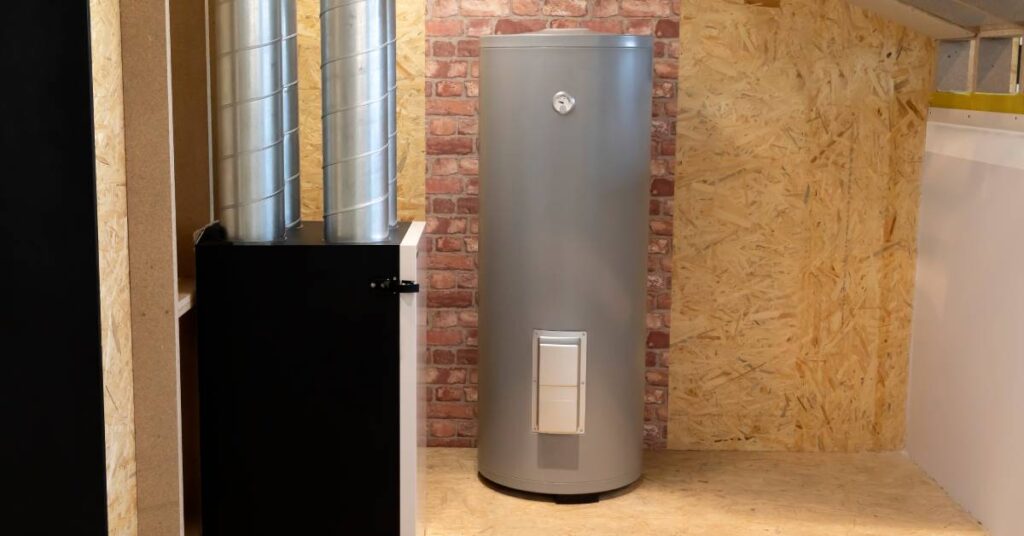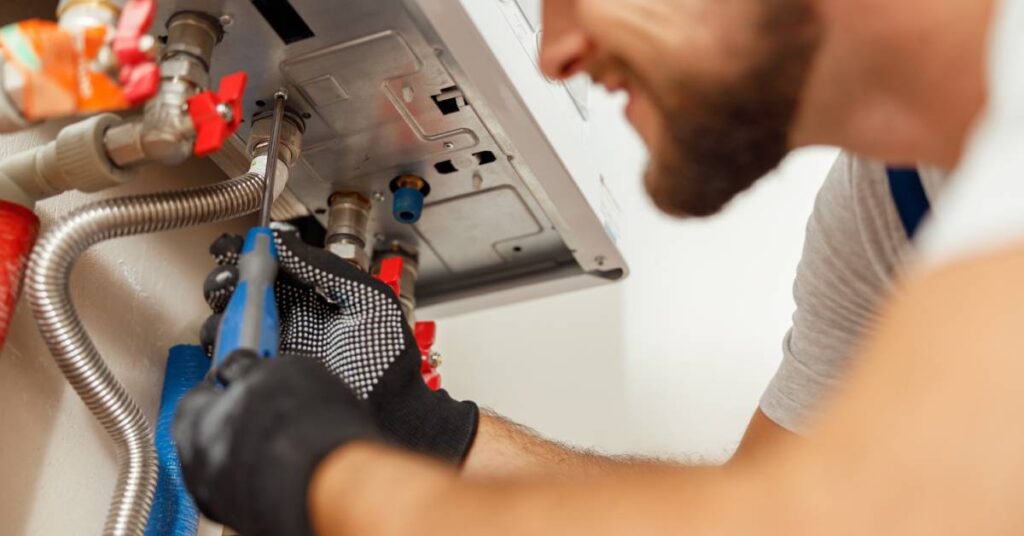
Water heaters support daily tasks such as bathing, cleaning, and cooking. Choosing the right water heater will allow you to enjoy better energy efficiency and consistent comfort in your home. Selecting the right model can feel overwhelming with so many options available. Fortunately, our complete buyer’s guide to hot water heaters can simplify the process. Let’s explore the options and help you select the perfect water heater for your home.
Types of Hot Water Heaters
The water heater’s primary purpose is to heat water and maintain it at a desired temperature for on-demand use. The two common types of water heaters are tank and tankless. However, other models exist. Here’s an overview of popular options:
Tank Water Heaters
Tank water heaters are common in most homes. These units store a set amount of water, which they continuously heat to keep ready for use. They have a lower upfront cost, making them an affordable entry point.
Traditional tank water heaters are easy to install and replace (if an upgrade is necessary). However, their design limits their hot water supply, and you may run out during peak usage times. Additionally, they consume more energy to maintain the water’s temperature due to constant heat loss.
These models suit households with moderate hot water needs who prefer tried-and-true technology.
Tankless Water Heaters
Tankless water heaters offer a modern solution by heating water on demand. These compact units deliver hot water whenever you need it rather than storing it. They save energy, as they don’t consume power when idle, helping you cut costs in the long run.
Their smaller design makes them ideal for homes with limited space. However, they cost more upfront and may struggle to accommodate larger households with heavy water demands, such as multiple showers running simultaneously.
Heat Pump Water Heaters
A heat pump water heater pulls warmth from the surrounding air to heat water. This innovative method makes it one of the most energy-efficient options available. Heat pump models reduce your utility bills while supporting environmentally friendly practices.
A downside is their higher initial cost and installation requirements, which demand sufficient space and a suitable climate. They perform best in warm climates with plenty of surrounding air circulation. This water heater could align with your goals if you prioritize sustainability and energy savings.
Gas Water Heaters
Gas water heaters need natural gas or propane to heat water, making them a popular choice in many homes. They heat faster than electric models and offer a consistent hot water supply even during high-demand periods.
Gas-powered systems have lower operating costs, especially in regions where natural gas is affordable. However, they require proper ventilation to safely release exhaust gases, which can complicate installation. These units suit households that prioritize quick recovery times and lower long-term fuel expenses.
Electric Water Heaters
Electric water heaters use electricity to warm water. They are widely available, simple to install, and require fewer safety measures than gas models. Their straightforward design makes them a practical choice for homes without access to natural gas.
While electric systems slowly heat large amounts of water, they excel in smaller households with lighter usage. They also pair well with solar panels or alternative energy, offering environmentally friendly options for energy-conscious homeowners.

Factors To Consider When Buying a Water Heater
An essential part of this complete buyer’s guide to hot water heaters is recognizing factors that influence your decision, such as household size and water demand.
Larger households require tank models or powerful tankless units to handle showers, laundry, and dishwashing throughout the day. On the other hand, energy-efficient models suitable for lighter usage support smaller or single-occupant homes.
Evaluate how much hot water you typically use during peak times to ensure the system can keep up. For example, a family of five with simultaneous showers likely needs beefier capacity than a couple who use theirs at staggered hours. Correct sizing prevents frustrations such as running out of hot water when you need it most.
Energy Efficiency
Choosing energy-efficient models can impact your budget and the planet. Water heaters rated with high Energy Factor (EF) or Uniform Energy Factor (UEF) scores use less electricity or gas, lowering ongoing costs.
Modern features, such as insulated tanks or smart temperature control, enhance efficiency. Consider efficiency alongside your water demands to avoid choosing an underpowered model that cannot meet heavy workloads.
Initial vs. Long-Term Cost
Compare upfront costs to potential long-term savings when deciding on a water heater. A high-efficiency model, while expensive initially, saves more over its lifespan than a lower-cost basic model. For instance, tankless models may seem more expensive, but they offset costs through lower utility bills over time.
Don’t forget to factor in maintenance or repair expenses. Investing in an efficient, reliable system upfront often helps you avoid unexpected issues later. Carefully evaluate your needs regarding purchase price and expected operating costs.
Available Space
Your home’s layout determines what kind of water heater you can install. Traditional tanks require sufficient room for storage tanks and fittings. Tankless water heaters fit more conveniently into smaller areas if your home has a tight installation site. Always measure the space to avoid compatibility issues.
Installation and Professional Help
Installing a water heater requires skilled expertise. Professional installation ensures safety, compliance, and correct setup. Look for well-reviewed professionals with experience installing your selected model for smooth implementation. Avoiding improper setups that lead to inefficiency or hazards protects your investment long-term. It’s well worth partnering with experts for safe, effective results.
Understanding Water Heater Lifespans
Consider how long different models typically last when choosing a water heater. Their lifespan varies based on the type and how well you maintain it. For example, traditional tank models typically last around 10 to 15 years, while tankless systems can serve you for up to 20 years with proper care.
Regular maintenance, such as flushing tanks or replacing worn components, can extend the heater’s usability and help you avoid early replacement costs. Keep in mind that as a system nears its lifespan, it may become less efficient or require frequent repairs. Factoring in longevity when purchasing a water heater ensures you make an investment that aligns with your household’s long-term needs.

Hassle-Free Water Heater Installation
At Oasis Heating, A/C, and Refrigeration, we take the stress out of water heater installation. Our team serves northern Virginia and provides top-tier service tailored to your needs. Our professionals will guide you every step of the way, whether you’re upgrading to a high-efficiency tankless system or replacing an older model.
Our certified technicians deliver flawless hot water heater installation services, ensuring every unit maximizes efficiency, safety, and long-lasting performance. You can trust us to handle every detail—no shortcuts, no surprises. Call us today at 571-322-6209.


![([site_name)]](/assets/templates/main/images/footer-logo.png)



